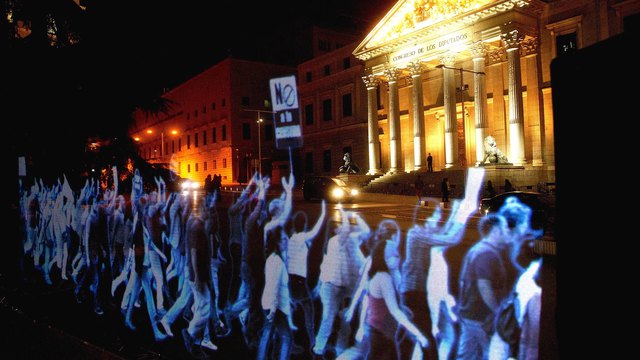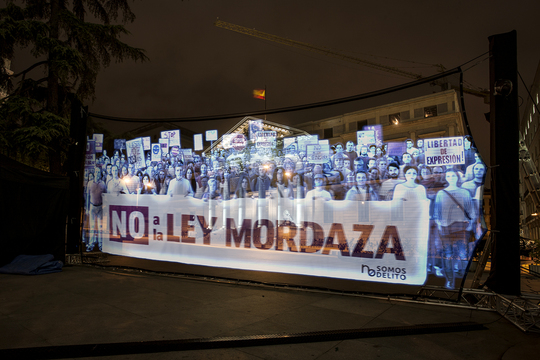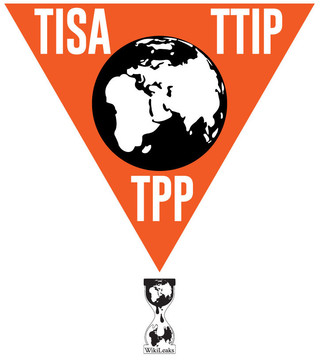Search results for 'aids activism'
Holograms for Freedom
Whistle Blowing for Change
Exposing Systems of Power & Injustice
Conferece & Book Launch:
Whistleblowing is one of the most difficult means of exposing misconducts and informing the public about unknown facts that must be revealed. It is an act based on ethics, honesty and accountability, that confronts abuses, discrimination, corruption and exploitation. Whistleblowers are people that want to change systems for the better, but that in many cases encounter reprisal and persecution. In other cases, they trust the systems too much, realising too late, and at high personal costs, that these systems are not willing to improve.
We are not surprised.
We are not surprised.
We are artists, arts administrators, assistants, curators, directors, editors, educators, gallerists, interns, scholars, students, writers, and more—workers of the art world—and we have been groped, undermined, harassed, infantilized, scorned, threatened, and intimidated by those in positions of power who control access to resources and opportunities. We have held our tongues, threatened by power wielded over us and promises of institutional access and career advancement.
The Next System Project
New Political-Economic Possibilities for the Twenty- First Century
The Next System Project is an ambitious multi-year initiative aimed at thinking boldly about what is required to deal with the systemic challenges the United States faces now and in coming decades. Responding to real hunger for a new way forward, and building on innovative thinking and practical experience with new economic institutions and approaches being developed in communities across the country and around the world, the goal is to put the central idea of system change, and that there can be a "next system," on the map.
1st ArtLeaks Working Assembly 2012
ArtLeaks invites you to a public working assembly around the issues that are at the core of the group's mission - exposing instances of abuse, corruption and exploitation in the art world. This is the official public launch of our platform, which began to operate in September 2011, and will be followed by a series of debates and workshops in the near future. These present a unique opportunity to engage more directly with conditions of cultural work that affect not only artists but creative workers in general: those from the traditionally creative fields as well as those generally involved in cultural production.
ReadNext 5 Minutes 1
The Next Five Minutes is a conference, exhibition and tv program taking place between 8th and 10th January 1993 in Amsterdam, that wants to leave behind the rigid dichotomy between the mainstream, commercial and national tv on one hand and marginal independent tv on the other. Although these differences may still be important, N5M wants to focus on tv-makers crossing the borders of tv-making and going into the spaces that the tv-world still has to offer.
ReadDow 'Run for Water' - 'Run for your Life!' protest
April 19, 2010
FOR IMMEDIATE RELEASE
Dow Throws a Dismal Party, Few Attend
Underattended "Run for Water" plagued by death, zombies, and dozens of "Dow spokesmen"; truth seems to run free
Digital Partisans
On Mute and the Cultural Politics of the Net
Participationism (re: Re:Group: Beyond Models of Consensus)
From: beka economopoulos
Date: June 10, 2010 6:07:12 GMT+02:00
Subject: [iDC] Participationism (was "why do we need physical campuses")
Hi all,
(...) Below is (one of) the curatorial statement(s) of a show that Not An
Alternative has curated with Upgrade NY! and Eyebeam, called Re:Group:
Beyond Models of Consensus, about the subjects of collaboration and
participation. After constant debate, the curatorial committee never
came to consensus about the thesis for the show, and so we've presented
two distinct positions.
Below is that of our group, Not An Alternative. The opening is
tomorrow, with a curators talk at 5pm, so if you're in NY and you're
ready for a rumble join us there.
Best, Beka
Tactical Media Connections
A public research trajectory tracing the legacies of Tactical Media and its connections to the present.
Under the working title 'Tactical Media Connections' the editors of the Tactical Media Files, David Garcia and Eric Kluitenberg have begun an extensive public research project that seeks to trace and develop the connections between the phenomenon of Tactical Media as it was identified in the early 1990s, not least through the renowned series of Next 5 Minutes festivals and conferences on Tactical Media (www.n5m.org - organised four times between 1993 and 2003), and current critical practices operating at the intersection of art, media, activism, technological experimentation and political contestation.
We Demand The Impossible:
An Interview with John Jordan and Gavin Grindon
Furtherfield interview with Gavin Grindon and John Jordan from the
Laboratory of Insurrectionary Imagination about the User's Guide to
(Demanding) the Impossible. Published by Minor Compositions.
A Virtual World is Possible: From Tactical Media to Digital Multitudes
I.
We start with the current strategy debates of the so-called 'anti-globalisation movement', the biggest emerging political force for decades. In Part II we will look into strategies of critical new media culture in the post-speculative phase after dotcommania. Four phases of the global movement are becoming visible, all of which have distinct political, artistic and aesthetic qualities.
Next 5 Minutes 3
Amsterdam & Rotterdam, The Netherlands, 12-14 March, 1999
The third Next 5 Minutes, an Amsterdam based conference on tactical communications culture, featuring do-it-yourself media, dissident art and electronic media activists from around the world, took place on the 12th, 13th and 14th of March 1999.
N5M3 archived festival website
ReadThe dark side of Camping
Camping can be so nice. Crawling out of dewy plastic in the early morning, with a pinch of sleep still in your eyes, braving the unbearably hot sun, yet invigorated and ready to take on the day with as much indifference as possible to the ongoing struggle with nature. Surely everybody knows that the secret of success is to fight the laws of petty bourgeois civilisation with minimal equipment and therefore gain a flexibility that is capable of suspending the otherwise ruling power relations for a clearly defined amount of time.
ReadPaolo Gerbaudo, Tweets and the Streets: Social Media and Contemporary Activism
"Tweets and the Streets analyses the culture of the new protest movements of the 21st century. From the Arab Spring to the "indignados" protests in Spain and the Occupy movement, Paolo Gerbaudo examines the relationship between the rise of social media and the emergence of new forms of protest. Gerbaudo argues that activists' use of Twitter and Facebook does not fit with the image of a "cyberspace" detached from physical reality. Instead, social media is used as part of a project of re-appropriation of public space, which involves the assembling of different groups around "occupied" places such as Cairo's Tahrir Square or New York's Zuccotti Park."
Help B92 Campaign
International support campaign for independent media in Yugoslavia, including the famous Radio B92 media center, in operation between March and July 1999.
ReadArt and the Human
The punk band Pussy Riot, which I belong to, is a musical group that conducts unexpected performances in different urban spaces. Pussy Riot's songs address topical political issues. The interests of the group members are: political activism, ecology, and the elimination of authoritarian tendencies in the Russian state system through the creation of the civil society.
Read



